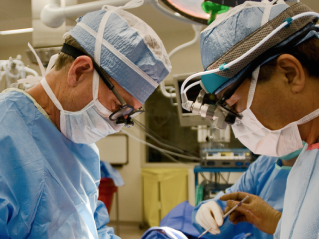


Overview
Our comprehensive team of heart and vascular experts is committed to providing the highest quality care to our community.
To find a heart or vascular specialist near you, visit our Find a Doctor page.
Ocean Pines
11107 Cathage Road
Suite 201
Berlin, MD 21811
410-912-6726
Salisbury, North
400 Eastern Shore Drive
Salisbury, MD 21804
410-543-7300
Salisbury, South
106 Milford St., Suite 605
Salisbury, MD 21804
410-912-6333
Seaford
200 Federal St.
Seaford, DE 19973
302-629-9099
Awards & Recognition
TidalHealth Peninsula Regional
The TidalHealth Guerrieri Heart and Vascular Institute is designated as a Cardiac Interventional Center by the Maryland Institute for Emergency Medical Services Systems (2014 - present).
Since 1974, the physicians at the TidalHealth Guerrieri Heart and Vascular institute have performed more than 300,000 interventional cardiology procedures and more than 15,000 open heart surgeries.
Among America’s 50 Best Hospitals for Vascular Surgery (Healthgrades, 2018)
Among America’s 100 Best Hospitals for Stroke Care (Healthgrades, 2018)
NCDR ACTION Registry-GWTG Gold Performance Achievement Award for the care of heart attack patients (American College of Cardiology, 2016)
TidalHealth Peninsula Regional listed as a “high performer” in Maryland in the specialties of COPD and heart failure (US News & World Report, 2016)
The TidalHealth Peninsula Regional Guerrieri Heart and Vascular Institute received the following national certifications:
- The Joint Commission Disease Specific Accreditation for the Treatment of AMI
- IAC Accreditation for the Echocardiology Lab
- AACVPR Program Certification – Cardiac Rehabilitation
- AACVPR Program Certification – Pulmonary Rehabilitation
- Member of the Maryland Cardiac Surgery Quality Initiative
TidalHealth Nanticoke
TidalHealth Nanticoke received the American Heart Association/American Stroke Association’s Get With The Guidelines®―Stroke Gold Plus Award with Target: Stroke Honor Roll for 2016.
TidalHealth Nanticoke received the American Heart Association/American Stroke Association’s Mission: Lifeline® Silver Receiving Quality Achievement Award for 2019.
TidalHealth Nanticoke’s Cardiac Rehabilitation program is nationally certified by the American Association of Cardiovascular & Pulmonary Rehabilitation (AACVPR).
New Patients: Your First Visit to TidalHealth Cardiology
Thank you for placing your trust with us for your cardiology needs. The following are some instructions to help prepare you for your first visit. Please arrive 15 minutes before your scheduled appointment to help complete any necessary paperwork.
What to bring to your first visit
- Insurance card(s)
- Photo identification
- Referral form (for HMO insurance, if required)
- Medication bottles/containers for all the current medications you are taking including prescriptions, over-the-counter medications, and any herbs
- Copies of all recent laboratory results performed by your primary care provider or referring specialist
- Information about your medical and surgical history: bring any pertinent x-rays or records you may have
- A list of questions you want to ask the doctor
Medication refill information
It is very important that we have complete records on your medication. The following instructions help us manage your medications:
- Bring your current medication list, including dosage and instructions to every office visit. This includes vitamins, supplements and over the counter medications.
- Ask for all prescriptions that you need refilled at the time of your appointment if possible.
- If you need a prescription refilled before your next appointment, please contact your pharmacy. They will send us a request to authorize the medication to be filled.
- Please allow our staff 48 (business) hours to refill routine prescriptions.
- If your medication requires authorization from your insurance, allow at least two weeks for it to be processed.
Cancellation policy
Please give our office 24 hours advance notice if you are cancelling or rescheduling an appointment. Nuclear medications are ordered specifically for the patient’s height and weight and expire within a short period of time. We will bill the cost of the radioactive medicine for all non-emergency nuclear testing cancellations within 24 hours of your scheduled test.
Insurance and billing
Our office submits a claim to your Primary and Secondary insurance as a courtesy, but you are ultimately responsible for the payment, regardless of your insurance coverage. Should you have a third (tertiary) insurance plan, it is your responsibility to submit those insurance claims. Please check with your insurance company for requirements. We must have a copy of your insurance card.
Medicare
We are participating Medicare physicians, a choice we made in order to provide maximum financial support to our many Medicare patients. This means that we accept Medicare's "allowable charge", leaving the remaining 20% due from the patient. Since we write off a substantial "non-allowed" portion of our regular charges for Medicare patients, we ask for your full cooperation in meeting two obligations:
- $183 deductible - payable each calendar year.
- 20% of Medicare allowable charge - payable each visit.
If you have other insurance coverage along with Medicare, we need to know which insurance is "primary" (billed first) and which is secondary (billed second). This most likely becomes an issue when the patient or spouse has employer-provided health insurance. Please come prepared with all Medicare and other health insurance information so that we can make a correct determination together.
Referrals
Your insurance may require pre-authorization or a referral to see one of our physicians. You must obtain the required referral and bring it with you to your office visit. Note: If your insurance plan requires a referral but you do not have one, you need to sign a waiver stating you agree to be responsible for payment in full.
Copays
Many insurance plans require a co-payment at the time of service. Please come to your appointment prepared to make your co-payment. The full co-payment amount is due on the day of service, or a $10.00 surcharge will be applied.
Paying for your care
Many insurance plans require patients to pay a deductible or co-insurance. We mail a statement to you for any amount not paid by your insurance. Please make payment in full within 30 days of getting the statement.
Patient balances past 120 days with no payment or payment arrangements made are turned over to a collection agency. In the event of a returned check, a $35.00 fee is charged to your account, and payment in full is due upon receipt of your statement.
Conditions
Stroke
Stroke Care Tips
If someone is showing signs of a stroke, call 911 immediately. Seconds save brain cells and more time means more treatment options for them.
Remember the phrase BE FAST to help spot symptoms of a stroke.
B - Balance: is there a sudden loss of balance or coordination?
E - Eyes: is there sudden blurred or double vision or sudden, persistent vision trouble?
F - Face: ask the person to smile. Does one side of the face droop?
A - Arms: ask the person to raise both arms. Does one arm drift downward?
S - Speech: ask the person to repeat a simple phrase. Is their speech slurred or strange?
T - Time: if you see any of these symptoms, call 911 immediately.
Types of Strokes
Hemorrhagic Stroke
This type of stroke is less common, seen in about 15% of all strokes. Hemorrhagic strokes occur when a brain aneurysm bursts or a weakened blood vessel leaks. The blood spills into or around the brain creating swelling and pressure, damaging the cells and tissue of the brain. This type of stroke is responsible for 40% of all stroke deaths.
Ischemic Stroke
This type of stroke is the more common type of stroke. It happens when a blood vessel in the brain is blocked. This causes blood not to reach that part of the brain and the cells die. Multiple risk factors like high blood pressure, diabetes, smoking, and lifestyle choices make a person more disposed to a potential stroke.
Transient Ischemic Attack (TIA)
This type of stroke occurs when blood flow to part of the brain stops for a short period of time. The symptoms mimic a stroke but usually last less than 24 hours. Though TIAs do not usually cause permanent damage, they warn that a stroke is possible in the near future. TIA symptoms should not be ignored.
Vascular Disease
Your vascular system, also called the circulatory system, is made up of blood vessels that carry blood throughout your body. Arteries carry blood away from your heart and veins return blood to your heart. Vascular disease includes those conditions that affect your circulatory system.
Peripheral Vascular Disease (PVD)
Peripheral Vascular Disease (PVD), also known as Peripheral Artery Disease (PAD), is a common condition in people 50 years or older. It occurs when there is a fatty build up in the blood vessels that carry blood outside of the heart and brain. PVD is a major cause of amputations and ulcers in lower extremities in the United States.
Risk factors for PVD include:
- Diabetes
- Smoking
- High blood pressure
- High cholesterol
Half of the people who have PVD don’t experience any symptoms, but symptoms may include:
- Painful cramping in the legs or buttocks when walking or moving, which goes away with rest. The pain can be severe and limit your ability to participate in activities.
- Burning or aching pain in your feet and toes while resting especially at night while lying flat.
- Cool skin in your feet.
- Redness or color changes in your skin.
- Sores on your toes and feet that do not heal.
Abdominal Aortic Aneurysms (AAA)
Weakened, bulging area in the lower part of the aorta. The aorta is the major blood vessel that supplies blood to the body.
Aneurysm
The ballooning at a weak spot in an artery wall.
Carotid Artery Stenosis
The carotid arteries are the two larger arteries that supply oxygen rich blood to your brain. Carotid Artery Stenosis occurs when a blockage occurs in a carotid artery. When a carotid artery is blocked, your risk of a stroke greatly increases.
Coronary Artery Disease
A condition where plaque builds up inside your coronary artery. Your coronary artery is the main artery that provides blood, oxygen and nutrients to the heart.
Critical Limb Ischemic (CLI)
A severe blockage in the arteries of the lower extremities – the legs, feet or toes. This blockage, a very serious form of PVD, significantly reduces blood flow. CLI is a chronic condition causing severe pain to the extremity, even while resting. Left untreated, the complications of CLI will result in amputation of the affected limb.
Deep Vein Thrombosis (DVT)
DVT is the formation of a blood clot inside a deep vein, usually in the leg or calf. DVT occurs when the clot partially or completely blocks blood flow. Symptoms may include:
- Swelling in your legs, ankles and feet.
- Pain in your legs, ankles and feet often starting in the calf. It can feel like cramping or a Charley Horse.
- Redness and warmth over the affected area.
- Pain or swelling in your arms and neck.
Occlusions
Occluded blood vessels in legs and neck are blocked blood vessels.
Varicose Veins
Enlarged veins, usually seen in the legs, that look blue or dark purple and appear to be twisted or bulging. These are largely a cosmetic issue but can lead to more serious issues such as leg pain, swelling, or cramping. Varicose veins often develop from an inactive or sedentary lifestyle, weight gain, prolonged standing or pregnancy.
Prevention, Diagnosis, and Treatment
Prevention
TidalHealth provides many opportunities for our community to check up on their heart and vascular health to stay healthy and well.
Screenings
Heart Health Screenings
Free heart health screenings are available by appointment at TidalHealth Peninsula Regional.
Screenings include:
- Free heart disease risk assessment including a fasting lipid profile (total cholesterol, HDL, risk ratio and glucose)
- Resting 12-lead EKG
- Body fat/body mass index
- Blood pressure testing
- Pulse oximetry testing
Participants should not be under the care of a cardiologist or have a known history of heart disease. Because of the blood test, a 12-hour fast is required.
Appointments are required and available on Thursdays. To schedule an appointment call, 410-543-7026.
Vascular Screenings
Free three-part vascular screenings are offered monthly at TidalHealth Peninsula Regional for people 55 and over with risk factors or symptoms of vascular disease. The screening includes an ultrasound of carotid arteries, an abdominal aortic aneurysm (AAA) screening and peripheral artery disease (PAD) screening.
Vascular Disease Risk Factors:
- High blood pressure
- Smoking
- Diabetes
- High Cholesterol
- Obesity
- Family History
Vascular Disease Symptoms:
- Leg pain when walking
- Numbness in the leg or foot
- Stroke-like symptoms
- Unexplained abdominal or back pain
This same screening is performed every other month at the TidalHealth Ocean Pines Campus in Berlin, Maryland.
Appointments are required. To schedule an appointment, call 410-543-7123.
Heart Disease
Diagnosis
Common ways to diagnose heart disease include:
- Physician Exam
- Blood Tests
- Chest X-Ray
- Electrocardiogram (EKG or ECG) – Using electrodes, your heart’s rhythm, frequency of beats, and electrical conduction are recorded. This shows if you’ve had a heart attack or if you have an abnormal heart rhythm.
- Echocardiograph (Echo) – Using an ultrasound machine, sound waves bounce off the heart muscle producing an image of the structure of the heart and its motion. This shows how well your heart is pumping.
- Exercise Stress Test – Walking on a treadmill, your heart rate, breathing and blood pressure are monitored. This shows how your heart responds to stress and changes in the blood supply to your heart during exercise.
- Coronary Angiography – A small tube or catheter is inserted into a blood vessel in your upper thigh or arm. Contrast dye is injected and an X-Ray is used to take pictures. This shows blockages or narrowing of arteries reducing blood flow to the heart.
Common Treatments
- Angioplasty – Also known as PCI or Percutaneous Coronary Intervention or Balloon Angioplasty, involves a small tube with a deflated balloon attached being threaded into the coronary artery. The balloon is then inflated to widen an area where blood flow has been reduced. This is often done in combination with a stent implant.
- Atherectomy – This is similar to an angioplasty but also uses a rotating shaver to cut away plaque. Removing plaque build up improves blood flow.
- Stenting – A wire mesh tube is permanently implanted to open an artery and improve blood flow.
Heart Disease FAQs
What is Cardiovascular/ Heart Disease?
Heart disease keeps the heart from functioning as it should. According to the Center for Disease Control (CDC), heart disease is the leading cause of death in the U.S. The most common form of heart disease is coronary artery disease that often shows itself as a heart attack.
Signs & Symptoms
Chest discomfort usually in the center of the chest lasting more than a few minutes or that goes away and comes back.
Discomfort in other areas of the upper body such as pain or discomfort in one or both arms, back, neck, jaw, or stomach.
Shortness of breath.
Physical inactivity
Other signs that may include a cold sweat, nausea, or lightheadedness.
What is Congestive Heart Failure? (CHF)
Congestive Heart Failure or CHF occurs when your heart is not pumping or circulating blood as it should. Heart damage can occur over time and may be the result from various conditions such as coronary artery disease, valve disease, high blood pressure or diabetes. As your heart weakens it circulates blood through your body at a slower rate. This increases the pressure on your heart and lungs. Not all conditions leading to heart disease are reversible, but treatment can improve your symptoms.
What is Arrhythmia?
Your heart has an internal electrical system. As the electrical signal fires, it causes the chambers in your heart to contract and relax. With arrhythmia your heart may beat too fast or too slow, not allowing your heart to pump enough blood.
What is Atrial Fibrillation? (A-Fib)
Atrial Fibrillation or A-Fib is one of the most common types of arrhythmia. It is an irregular heart rate that can lead to heart-related complications including blood clots, stroke, and heart failure.
What is Cardiac Ischemia?
Myocardial or Cardiac Ischemia occurs when the blood flow to the heart is decreased due to a blockage in the coronary arteries. The blockage reduces the amount of oxygen going to the heart which decreases your ability to exercise. A complete blockage may lead to a heart attack. Myocardial ischemia can also cause serious abnormal heart rhythm.
Arrhythmia Treatment
An arrhythmia is an irregular heart rhythm caused by disturbances in the heart's electrical system that controls the rate and rhythm of your heartbeats. Common conditions that are considered arrhythmias are tachycardia, a fast or rapid heartbeat, and bradycardia, when the heartbeat is too slow.
The TidalHealth Guerrieri Heart & Vascular Institute uses imaging tools, ablation and devices to manage heart rhythm disorders. We offer the only comprehensive electrophysiology (EP) program in the region, with diagnostic and therapeutic procedures including:
- Cryoablation for atrial fibrillation (A-Fib)
- Implantable cardioverter defibrillators (ICDs)
- Implanted event monitors
- Pacemaker implants and devices for patients with heart failure.
State-Of-The-Art Treatment Options
The TidalHealth Guerrieri Heart & Vascular Institute features two electrophysiology labs and offers state-of-the-art treatment options. If you have a heart arrhythmia, ask your physician to refer you to one of the cardiology practices at TidalHealth; the cardiologists and electrophysiologists then decide the best treatment options for you in managing your arrhythmia.
Interventional Cardiology
TidalHealth is proud to be the providers of choice for patients on Delmarva with blocked arteries, coronary artery disease and other conditions. Our physicians perform thousands of cardiac catheterizations, angioplasties and other interventions – including coronary stenting – annually. We take a comprehensive approach to care, with a variety of specialists contributing to the treatment of each patient.
Lower Extremity Amputation Prevention
Each year, millions of people across the country are diagnosed with Peripheral Vascular Disease (PVD) or Critical Limb Ischemia (CLI). Left untreated, the loss of blood flow to lower extremities – legs, feet or toes – can result in the need for amputation of all or part of a limb.
For patients receiving a lower limb amputation nationally, about 70% have not received any testing to see if blood flow can be restored to save all or part of the limb. That’s why TidalHealth has implemented the Save a Limb program to quickly identify patients while amputation can still be prevented.
If you have a patient or are a patient with PVD or CLI and you think a lower extremity amputation has to be done, STOP– there may be another option. Call the TidalHealth Save a Limb program at 302-628-6222.
What is the Save a Limb program?
The Save a Limb program puts in place a process to quickly identify patients to determine if a procedure may be able to save all or part of a limb. Time is important to give patients the best possible outcome. If there is a possibility for improved blood flow, the patient receives care based on the severity of the disease. The Save a Limb program can get a patient into care within hours or days, depending on the patient’s individual need.
TidalHealth’s Save a Limb program is a part of TidalHealth Nanticoke’s cardiology program and includes a care team with interventional cardiologists, endocrinologists, podiatrists, wound care specialists and primary care physicians.
The initial triage can be done in person or by phone. A physician or a patient can call to get help quickly.
Surgery
Since 1982, the open heart surgery program at TidalHealth Peninsula Regional has provided cardiac care to the community. Our program developed from the region’s first open heart procedure that was performed here in 1974.
We provide the highest quality cardiovascular and thoracic surgery on the Delmarva Peninsula and we are one of the busiest heart programs in Maryland, performing more than 450 open heart surgeries every year.
Our surgical program offers the latest revolutionary procedures such as endoscopic vein harvest, transmyocardial revascularization (TMR), and beating heart valve surgery.
Before Surgery FAQs
Do I need to complete any tests before my surgery?
Pre-admission testing typically includes blood work, an electrocardiogram and a chest x-ray, and should be performed three to ten days before your procedure. Your surgeon will tell you which tests you need and help you schedule them.
What should I do if I get sick before my surgery?
If you develop a cold, virus, sore throat, or other illness during the week before your surgery is scheduled, contact your surgeon immediately to discuss whether your surgery should go ahead.
What should I bring to the hospital on the day of my surgery?
Be sure to bring a list of medications (including herbal remedies and over-the-counter drugs) that you take on a regular basis and a list of any known allergies, as well as your insurance cards and any communication with your insurance company regarding your admission.
Also, bring personal items that you rely on, such as eyeglasses, hearing aids, or dentures, and any documents you may have regarding advance medical directives. We encourage you not to bring jewelry, large amounts of cash, or other valuables.
Can my family members stay with me until I go into the operating room?
Friends and family members are welcome to accompany you to the Same Day Surgery registration area on the day of surgery. For patient safety, visitors are not permitted in the pre-operative assessment, holding, or PACU areas. The waiting area is in Same Day Surgery.
After Surgery FAQs
I’m worried about the pain from the surgery. What should I do?
Our priority is making sure that you are as comfortable as possible after surgery. We offer many different methods of alleviating pain, and you should discuss them with your surgeon or anesthesiologist. They help you understand the options and select the best solution for you.
How long will my recovery be?
This is different for each patient, and depends on how well you are before surgery. You will probably go home 5-7 days after cardiac surgery – TAVR surgery patients usually go home in three to four days, but recovery can take up to three months. Some patients recover quickly and are back to work in four weeks. If you feel ready to go back to work early we recommend part-time to start.
When can I drive?
Driving is restricted for six weeks after surgery. This is a safety issue. The sternum is healing and the bone is healing. If you had a car accident where the steering wheel hit the sternum, it would affect healing. Also, certain movements of driving may cause pain, interfering with normal reflexes.
When can I leave the hospital?
Usually five to seven days after surgery if there are no complications.
When can I go back to work?
Two to three months recovery is expected after surgery. Many patients go back to work in four to six weeks after surgery, but we recommend returning on a part-time basis.
Can I shower?
You can shower once wires and sutures are removed.
Do I resume medications taken before surgery?
You should take only medications that are prescribed for you at discharge.
When will I see my surgeon?
You will typically see your surgeon for a followup appointment four weeks after discharge. A date will be given to you before discharge.
When will I see my surgeon?
You will typically see your surgeon for a followup appointment four weeks after discharge. A date will be given to you before discharge.
When will I see my cardiologist?
You will see your cardiologist seven to ten days after discharge.
Are there any restrictions?
No heavy lifting, pushing or pulling for six weeks after surgery.
When can I resume sexual activities?
As soon as you feel ready. Avoid positions which put extra strain on your chest.
When can I resume normal activities?
You can do as much as you feel able to do and should be following your home based exercise/walking program.
How can I expect to feel when I get home?
You can expect to feel tired. Recovery is ongoing and each day you will feel a little better. Pain medication may be needed for a few weeks after discharge, especially at night. Be patient with your recovery.
When should I call?
If you have any concerns or questions, please call. Possible medical emergencies include, increased temperature, discharge, redness, swelling or odor at the incision site, or shortness of breath at rest. (Shortness of breath with activity can be expected to get progressively better).
Structural Heart
TAVR Procedure (Transcatheter Aortic Valve Replacement)
Transcatheter aortic valve replacement, or TAVR, is a less invasive, often life-saving option for those who cannot undergo open heart surgery for the treatment of aortic stenosis. TidalHealth Peninsula Regional is the only hospital on the Eastern Shore offering TAVR. To learn more, call our Valve Clinic at 410-546-1353.
TMVR Procedure (Trans Mitral Valve Replacement)
Trans Mitral Valve Replacement, or TMVR, is a non-surgical and minimally invasive alternative for patients with mitral valve regurgitation who are considered too high risk for traditional open heart surgery procedures. To learn more, call our Valve Clinic at 410-546-1353.
Left Atrial Appendage Closure Device (Watchman Procedure)
The TidalHealth Guerrieri Heart & Vascular Institute in cooperation with TidalHealth Cardiology offers Left Atrial Appendage Closure. Patients are evaluated with atrial fibrillation for this interventional procedure to manage risks related to anticoagulation therapy, or for patients who cannot take anti-coagulation therapy or blood thinners. This procedure reduces the risk of stroke in patients with A-Fib. Physician referral is required. To learn more, call 410-334-2227.
Ongoing Support
Heart Failure Support Group
TidalHealth Nanticoke holds a monthly support group for people with heart failure as well as their families and caregivers. Participants can meet others with the disease and share stories, tips and tricks.
For more information and to register, call 302-629-6611, ext. 2428.
Implantable Cardioverter Defibrillator (ICD) Support Group
TidalHealth offers a support group to allow those with implantable cardioverter defibrillator (ICD) devices and others to become more knowledgeable and comfortable with having an ICD. The group is open to patients, family, friends, and caregivers, and will allow you to meet and share with others who have been through similar experiences. Confidential group discussions, education and peer support will be facilitated. Please join us and bring one guest if you wish.
Meetings take place on the second Tuesday of each month from 9 am to 10 am at TidalHealth Adult Fitness, 800 S. Salisbury Blvd., Suite D (across from Acme in Salisbury
For questions or more information, please contact:
Sue Colliton, RN
410-543-7026
[email protected]
Trish Laun, RN
410-334-2227
[email protected]
Clinics
Outpatient Cardiology
TidalHealth Cardiology has locations in Ocean Pines, Salisbury and Seaford. Our providers are proud to provide the best, most modern heart care to the Delmarva Peninsula.
Coumadin Clinic
Coumadin is the brand name for Warfarin Sodium, which is a common anticoagulant (blood thinner). Our Coumadin clinics are directed by physicians and managed by staff knowledgeable in anticoagulation therapy.
Vein Care
If you suffer with unsightly or uncomfortable varicose veins, the TidalHealth Vein Care can help. Swelling and pain in your legs could be the result of poor or inefficient circulation. More than 40 million Americans needlessly suffer from this condition.
Rehabilitation
Cardiac Rehabilitation
Cardiac rehabilitation helps cardiac patients achieve and maintain optimal health. Rehabilitation sessions are conducted by specially-trained cardiac nurses. Our program is designed to help cardiac patients by:
- Improving cardiovascular function
- Promoting healthier lifestyles
- Providing practical strategies for health improvement and risk reduction
- Allows participants to get back to work as quickly as possible
You are eligible if you have had one of the following:
- Heart attack
- Bypass surgery
- Angioplasty (balloon)/stent
- Angina (chest pain or pressure)
- Repair or replacement of heart valve
- Heart transplant
- Heart failure
Benefits of Cardiac Rehabilitation:
- Education and support
- Personalized exercise program
- Connection with other heart patients
TidalHealth Cardiac Rehabilitation offers a conditioning phase referred to as Phase II.
Various classes are available Monday through Friday. Patients are scheduled for a particular class session during their orientation session.
We can help you get a referral from your physician.
TidalHealth Peninsula Regional
Cardiac Rehabilitation
100 E. Carroll St.
Salisbury, MD 21801
410-543-7026
TidalHealth Nanticoke
Cardiac Rehabilitation
801 Middleford Road
Seaford, DE 19973
302-629-6611, ext. 2428
Peripheral Artery Disease (PAD) Rehabilitation
Peripheral Artery Disease (PAD) rehabilitation is a supervised exercise rehabilitation program and is considered a primary treatment for people with PAD. Through our program, supervised exercise is performed three times per week. Program components include treadmill walking, light resistance training stretching, and weekly educational topics addressing risk factors of PAD. Each session is delivered by qualified exercise physiologists and registered nurses who are skilled in exercise therapy for PAD.
One in 20 adults over age 50 will develop PAD, and about half of those individuals will suffer from leg pain or cramping. The pain tends to lead to more sedentary lifestyles, reduced functional capacity, and an overall decrease in quality of life. The goal of the PAD rehabilitation program is to decrease leg pain, increase walking capability, and increase functional capacity. This will improve overall health and quality of life.
Patient eligibility
- A documented PAD diagnosis with symptoms of claudication (leg pain caused by limited blood flow) with walking
- A completed physician referral
- Ability to attend three days a week for 12 consecutive weeks
- Ability to walk on a treadmill
TidalHealth Peninsula Regional
Peripheral Artery Disease (PAD) Rehabilitation
100 E. Carroll St.
Salisbury, MD 21801
410-543-7026
Pulmonary Rehabilitation
Pulmonary rehabilitation is a program that can help improve breathing combining exercise and education. Our program helps those who suffer from lung problems including chronic obstructive pulmonary disease (COPD) and restrictive pulmonary diseases like asthma, chronic bronchitis, cystic fibrosis, interstitial fibrosis and many others.
Benefits of Pulmonary Rehabilitation include:
- Reduction in shortness of breath
- Improved endurance and independent function
- Increased knowledge of how to better manage current health conditions
- Better understanding of medications
TidalHealth Pulmonary Rehabilitation offers a conditioning phase referred to as Phase II.
Various classes are available Monday through Friday. Patients are scheduled for a particular class session during their orientation session.
We can help you get a referral from your physician.
TidalHealth Peninsula Regional
Pulmonary Rehabilitation
100 E. Carroll St.
Salisbury, MD 21801
410-543-7026
TidalHealth Nanticoke
Pulmonary Rehabilitation
801 Middleford Road
Seaford, DE 19973
302-629-6611, ext. 2428
Adult Fitness
Adult Fitness is a medically based, supervised exercise program for patients who have completed Cardiac Rehabilitation and/or Pulmonary Rehabilitation, or those who are seeking a structured exercise program.
Clinical Research
The TidalHealth Guerrieri Heart & Vascular Institute supports clinical research and trials offered to cardiovascular patients. Several studies at TidalHealth Peninsula Regional have gone on to become national protocol. For example, the P2Y12 – platelet inhibitors (brilinta and effient) and the bio-reabsorbable stent trial included our patients.
We are proud to work with Clinical Research to bring the latest technologies to patients in our community.
TidalHealth Cardiology participates in Phase II – IV clinical drug and device research. Our mission is to promote patient health and education by providing cutting-edge cardiology research for the Delmarva Peninsula.
Our areas of interest include:
- Hypercholesterolemia
- Coronary Artery Disease
- Heart Attack
- Stroke
- Peripheral Vascular Disease
- Pacemakers
- Defibrillators
- Cardiovascular Stents
- Congestive Heart Failure
- Atrial Fibrillation
- Diabetes
For more information, visit our TidalHealth Richard A. Henson Research Institute page.
Referring Physicians
Program Protocols - Cardiovascular/Pulmonary Rehabilitation - TidalHealth Peninsula Regional
Program Protocols - Cardiovascular/Pulmonary Rehabilitation - TidalHealth Nanticoke
Program Protocols - Adult Fitness



